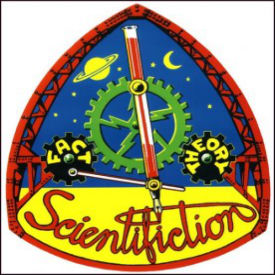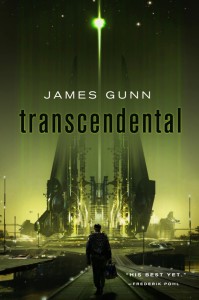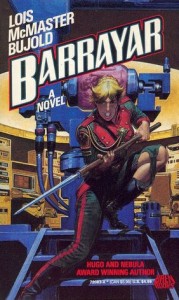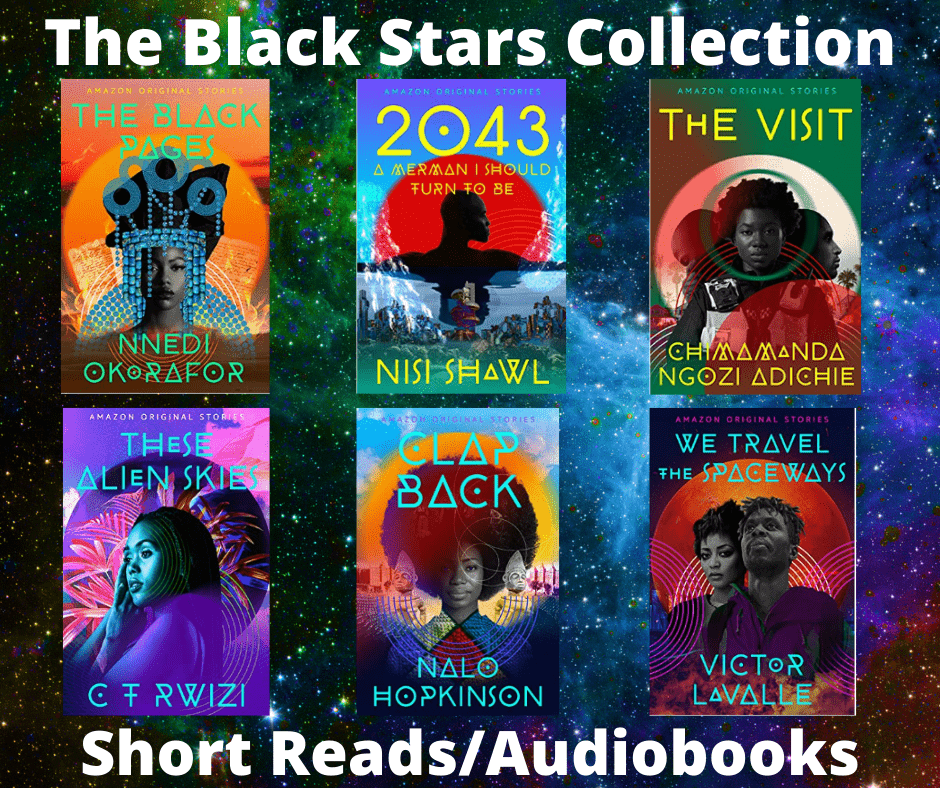 Last week we explored our ultimate science fiction reading list through the eyes of some of my favorite science fiction authors and editors. This week I am going to turn the mirror on them and let them tell you about some of their greatest works.
Last week we explored our ultimate science fiction reading list through the eyes of some of my favorite science fiction authors and editors. This week I am going to turn the mirror on them and let them tell you about some of their greatest works.
Science fiction contains so many amazing works that it is impossible to list them all here, or for that matter, to read them all in a single lifetime. The books discussed here are examples of all that is good within the science fiction industry. You can’t possibly go wrong picking up any one of them. I hope you discover something new and give it a good read. I guarantee the experience will be rewarding.
Award-Winning Author Kim Stanley Robinson (Mars Trilogy. Red Mars, Green Mars, and Blue Mars)
The Mars trilogy tells the story of the human inhabitation of Mars, and the creation of a viable Martian biosphere, using Terran life to start things off, and altering the atmosphere of Mars and creating a hydrosphere, both by heating the place up. In the process of doing this, a new society with new social forms, politics, and economics, also grows up with the planet. In the terms of the book, everything there gets areoformed. The story is told by following a cast of characters that is relatively small, but central to the action; mainly they are members of the first hundred permanent residents, and some of them get life extension treatments so that they live through the entire two centuries that the novel traverses. So, some kind of epic novel.
 SFWA Grand Master Robert Silverberg (Science Fiction 101)
SFWA Grand Master Robert Silverberg (Science Fiction 101)
Science Fiction 101 is about to return to print under the auspices of Berkley Books, and I do agree that it should be on everyone’s reading list. It opens with a long autobiographical essay in which I set forth some of my own ambitions as a young SF writer and how I turned them into reality, and then presents thirteen short stories, by such writers as Kuttner, Bester, Sheckley, Dick, Vance, and James Blish, from which I was able to learn my craft. Each story is linked to a critical essay in which I discuss the virtues of the story and the particular technical aspects by which the writers created their powerful effects.
Award-Winning Editor Ellen Datlow (Snow White, Blood Red)
Snow White, Blood Red was first published in 1993. In addition, many original fairy tales were not written for children. They were bowdlerized later. So one could say that with our series we returned fairy tales to their roots, while often providing a contemporary take on a very old story. There’s sex and violence and humor and beauty and ugliness and poetry. There are stories and poetry by Tanith Lee, Neil Gaiman, Jane Yolen, Charles deLint, Steve Rasnic Tem, Melanie Tem, Nancy Kress. Patricia McKillip, Gregory Frost, and eleven other authors.
The book has been my most successful anthology by far, rarely being out of print. It’s currently available in hardcover from the B&N proprietary imprint Fall River Press, and will be available as an e-book for the first time this fall.
Science Fiction Legend Ben Bova (The Grand Tour Series and New Earth)
The term “Grand Tour” came from my readers. The novels show how the human race expands through the solar system — how, and why, and by whom. As well as who opposes this expansion, and what’s happening on Earth to motivate it. Thus we have novels about the Moon, Mars, Jupiter, Venus, Saturn and Mercury, plus a few more set in the Asteroid Belt.
New Earth takes us beyond the solar system for the first time. A group of human explorers journeys to an Earthlike planet orbiting the star Sirius. According to all we know of astrophysics, that planet shouldn’t exist. It should have been blasted apart when Sirius’ dwarf star companion exploded, eons ago. But there it is, impossible or not, an almost exact duplicate of Earth. And it turns out to be inhabited by people who are completely human.
Is it for real? Or a trap?
SFWA Grand Master James Gunn (Transcendental)
 Transcendental is a return to the space epics with which I began my novel-writing career back in 1955 but bringing to it fifty-five years of the reading, writing, and teaching I have done, and the sophistication that has come to the topic in recent years. In Transcendental readers will find, if they want to look for them, evidences of those experiences, as well as a focus on what I take to be, as Cory and Alexei Panshin pointed out in their book The World Beyond the Hill, the basic concern of science fiction, transcendence. The novel shapes itself around a search for a rumored “transcendental machine” that may lie hidden in a remote area of the galaxy and the spaceship quest by assorted aliens and humans to reach a goal that may not exist while unsuspected forces work to reach the goal first or destroy the pilgrims.
Transcendental is a return to the space epics with which I began my novel-writing career back in 1955 but bringing to it fifty-five years of the reading, writing, and teaching I have done, and the sophistication that has come to the topic in recent years. In Transcendental readers will find, if they want to look for them, evidences of those experiences, as well as a focus on what I take to be, as Cory and Alexei Panshin pointed out in their book The World Beyond the Hill, the basic concern of science fiction, transcendence. The novel shapes itself around a search for a rumored “transcendental machine” that may lie hidden in a remote area of the galaxy and the spaceship quest by assorted aliens and humans to reach a goal that may not exist while unsuspected forces work to reach the goal first or destroy the pilgrims.
Award-Winning Author Lois McMaster Bujold (Captain Vorpatrils’ Alliance and Vorkosigan-universe series)
Broadly, it’s a romantic comedy and caper novel in SF drag, which, while it has series roots, stands alone: everything you need for a read, complete in this kit. Also (as always with me) a character study—studies—but that part is best discovered for oneself.
Longtime sidekick Ivan Vorpatril, known to his overachieving relatives as “Ivan, you idiot,” (and whose tagline has always been, with some justification, “It’s not my fault!”), finally gets his (unwanted) place in the spotlight. Suckered by ImpSec spy and cousin Byerly Vorrutyer into protecting a beautiful Jacksonian refugee on the run from the forces that brought down her powerful family, Ivan finds himself, ultimately, in a much deeper hole than anyone had imagined. Watching him dig himself out provided me, at least, with a great deal of amusement; my readers as well, judging by the reviews.
I note that the book has had much the same reader response as its immediate predecessor CryoBurn, also a late-series book. Long-time series readers would insist one must read umpty-ump other books first; but brand-new readers reported they got along just fine. In this case, I would suggest that one go with the latter votes.
 I drifted in to my Vorkosigan-universe series one book at a time, back in the 80s, without an over-arching plan of some plot to be finished in some set number of pre-contracted volumes. My first goal was simply to get to the end of my first novel. The series’ growth thereafter has been organic; I used to joke that I had no more idea of where central character Miles Vorkosigan’s life was going than he did. This gave me a great deal of elbow room for trying out different ideas within the series framework, exploring all kinds of plots and tones—I wanted to see how many genres I could fit in! There are, after all, no actual genre police out there to enforce the norms.
I drifted in to my Vorkosigan-universe series one book at a time, back in the 80s, without an over-arching plan of some plot to be finished in some set number of pre-contracted volumes. My first goal was simply to get to the end of my first novel. The series’ growth thereafter has been organic; I used to joke that I had no more idea of where central character Miles Vorkosigan’s life was going than he did. This gave me a great deal of elbow room for trying out different ideas within the series framework, exploring all kinds of plots and tones—I wanted to see how many genres I could fit in! There are, after all, no actual genre police out there to enforce the norms.
Nonetheless, I did have one early structural model—C. S. Forester’s Hornblower books, the adventures of a British naval officer in the Napoleonic wars. Each volume stood alone as a complete adventure, but, taken together, they ended up becoming a fascinating biography of the hero as he grew and changed over time, each volume serving two (or more) purposes at once. (It was also written out of internal-chronological order, by the way.) As a long-time series reader myself, I was very aware how difficult it could be to acquire series books in order—I grabbed the Hornblower books at random as I could get them, but still had very satisfactory reads.
The most important thing turns out to be what to leave out. Every book, even the first in a series or a stand-alone, has an implicit backstory that is not recounted in exhaustive detail, but merely alluded to as needed. (Well, I suppose some of James Michener’s bricks were an exception. He often started with the paleogeology.) The trick was simply to treat all the other volumes as I would the backstory for any new book. It turns out one can dispense with quite a lot—which has the added advantage of sustaining suspense and surprise regardless of what direction the reader passes through one’s fictional landscape. Tight point-of-view is also very handy, since whatever character the story is being told through may well not know all that history either, the way most of us know so very little about our parents.
I resisted numbering the books for years, not least because I might always drop in a prequel somewhere and upwhack the numbering system (which I actually did a couple of times). Certain recent automated bookselling bots insisted, however, so we reluctantly assigned numerals to all the volumes. Don’t take them too seriously. I think a better bet is my slightly more free-form guide, here:
Short version: while the entire series need not be read in order, there are embedded a few two- or three-book sub-arcs that repay doing so, such as Shards of Honor followed by Barrayar.
But in the meanwhile, unless one is wildly spoiler-phobic, no one should be required to read any other Vorkosigan volume before Ivan’s tale. The new readers’ experiences will be different from those of the old readers, certainly, but they won’t be wrong. And, when they circle back and pick up the rest, and then read Captain Vorpatrils’ Alliance again, it will seem like a whole new book with the same text; two reads for the price of one. A bargain, I say.
Best Selling Author Daniel Abraham (The Black Sun’s Daughter series as M. L. N. Hanover )
The Black Sun’s Daughter project was all about taking the usual tropes of urban fantasy — the girl with unexpected superpowers, the world full of supernatural bad guys, the snarky tone — and use them to talk about the things I think urban fantasy’s built to talk about. The difference between empowering women and weaponizing them, for instance.
 Award-Winning Author Bradley Denton (Blackburn)
Award-Winning Author Bradley Denton (Blackburn)
Blackburn is about a young man named Jimmy Blackburn who, like many of us, has a highly developed sense of justice. Unlike many of us, however, Jimmy is willing to put himself on the line to enforce his beliefs whenever he sees them violated. This leads to many offenders being punished at his hands. Some of them die.
Blackburn was first published in 1993 . . . and after Jeff Lindsay’s Dexter books came out a number of years later, some commentators said that Blackburn was actually the first fictional serial killer who only killed those who deserved it. I have to disagree slightly — because Jimmy Blackburn is not really a “serial killer” in the usual sense of the term. “Serial killers” do what they do out of a psychosexual compulsion. Blackburn, however, is compelled only by his hyperdeveloped sense of right and wrong.
He does do it over and over again, though. So in that regard, maybe he is a serial killer after all.
Best Selling Author Ty Franck (Expanse Series as James S. A. Corey with Daniel Abraham)
The series so far includes Leviathan Wakes, Caliban’s War, and Abaddon’s Gate. We’ve also published two short stories: The Butcher of Anderson Station, and Drive.There’s a novella length work called God’s of Risk out, too.
The Expanse is based on two thoughts I had: Why is there so little SF written in the period between near future Earth-bound SF, and far future galaxy spanning civilization SF? And, what is the scariest possible explanation for Fermi’s Paradox? So we’re telling the story of a mid-level human civilization that spans several planets in our home solar system, but is beginning to move out into a galaxy that is a far scarier place than it could have imagined.
So many good reading opportunities, so little time. I suggest we all go out and start reading right away. Good luck in your exploration of these amazing worlds.











2 Comments